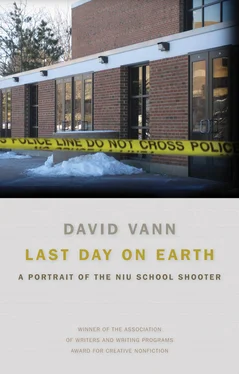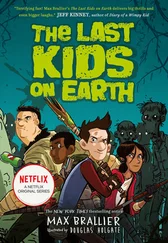We walk a few blocks, meet the Salvation Army program director for lunch, and then take the full tour, marching up and down narrow stairways and hallways, peeking in residents’ rooms with closets full of protein powders, hearing about programming and challenges. This was Steve’s field, criminology and corrections, and these were his friends, so I try to just soak it all in. The place was formerly a YWCA, and it feels like that, similar to a large, simple youth hostel in a city, only with a few more rules. I’m surprised to learn that the average time inmates stay in prison in the United States is only a year. And it’s the work of places like this to undo all the negative behaviors inmates have learned during their year in a broken system.
Steve was in a group home with similar rules, and several others in the ACA have connections, also. Josh’s brother was in and out of juvenile detention, for instance. “Whenever he was out, he had the stigma of being from juvie,” Josh says, and this created an awful momentum. This is what brings Josh and others to want to do such selfless work, helping people change the momentum of their lives.
We walk to a café afterward for drinks, and now, after five hours, the group begins to talk about Steve. I’m all ears, but I don’t ask questions. They say they thought it was someone else when they heard the shooter was a sociology grad student. There were several others, in fact, who seemed more likely to snap. “It couldn’t have been Steve,” Amy said. But then the group talks about how Steve dressed up for Halloween as Billy the Puppet, the doll from the SAW movies, which were his favorite.
“Do you think the gun he had was real?” Jim asks.
“Could be,” Josh says. The others don’t know, but they remember him carrying a pistol that night. “I can’t believe the media hasn’t found the photos of that costume,” Josh says.
Afterward, I drive Josh home an hour to DeKalb, then have dinner with him and his wife and her friend. Josh tells me funny stories, how he was afraid of Disney World for years because his dad almost drowned him twice and lost him there. On a water ride, his dad leaned back to make it more exciting but that banged Josh’s head into a piece of metal and he had to be fished out of the water and given CPR. Then Josh was trying to stand up on some kind of boogie board or surfboard and fell and it whacked him in the head and he was knocked out again and had to be dragged ashore. Then his parents lost him and he was found by a showgirl from the Horseshoe Saloon, and a guy in a sheriff’s outfit with a star went and found his parents.
He also tells me grad school made Steve really anxious because there wasn’t enough structure. “Steve liked being told what to do when, like in the group home.” When he was assigned a paper or other work, he’d do it immediately, far ahead of Josh, and then still worry about it. “He was all about control.” Josh also says that when Steve moved away to the new grad program at the University of Illinois in Urbana-Champaign, he lost his support network, all his friends in DeKalb. He didn’t make new friends easily in the new school.
After the shooting, Josh was going around trying to help everybody, trying to be there for friends, and he was staying up all night drinking. He’d drink a full bottle of hard liquor and then wake up feeling even worse. He stopped, finally, when he almost gave his two-and-a-half-year-old daughter the wrong medication. That scared him enough to stop.
So this is how my first two weeks go. I visit Jim’s classes, both under-grad and grad. I attend a conference the department holds on ethnography and learn that what I’m doing here is really an ethnography, trying to blend into this community. And I go to a candlelight vigil for the one-year anniversary of the Virginia Tech shootings.
The sociology grad students all stick together, and they watch yet again as Steve is erased from memorials. Commemorative bracelets are handed out, and there are only five beads, for his victims, no sixth bead. “It’s like we’re not allowed to grieve because of what he did,” his friend Alexandra Chapman says. In the first days, she tried to remove a Columbine shirt that was stapled over Steve’s memorial cross on campus. “It was really hard to remove, with all the staples, and then suddenly there was a camera and bright light right in my face. The world met him that day, a different Steve than we knew, and they all hated him.”
I feel sorry for Alexandra and the others. They’re going through suicide bereavement while the rest of the world is trying to make sense of a mass murder, hounding them for answers. And the truth is, they don’t know anything. I see why CNN, the Chicago Tribune , the New York Times , the Washington Post , and many others have gotten nowhere. Steve was a very private person. He hid everything important.
My last night in DeKalb, I go bowling with all the grad students, and after a few drinks, one of them mentions that her cousin, Julie Creamer, dated Steve in high school. “She and Steve lost their virginity together. They were both on lithium and bonded through having the same diagnosis. He was a Goth then, wearing all black, and he loved Marilyn Manson. Julie tells stories like he was violent at times, beating at a wall or something when he didn’t do well on a test. You should give her a call.”
IN THE FALL OF 2004,the same fall he meets Mark, Steve also has a new girlfriend, “Kim.” An art student he describes as “eccentric,” but he likes her. It’s been a long time since he’s had anyone. So now he’s doing better socially.
He’s sick from all the anxiety, though. “I had extended conversations with him regarding him and Kim,” Mark says. “When they were together, I provided him with quite a bit of advice. He always says how stupid he was for this or that. He had very low confidence with relationships. And at the beginning he was very to himself, right? So, it was hard to get him to open up, but once you became friends with him, he didn’t hold his cards as close — and that’s one thing he complained about with me, that I always held my cards close.”
Steve gets physically sick from the anxiety. Abdominal pain, nausea, diarrhea. His acne gets worse, too. His body betraying him yet again. He goes to the doctor on April 18, 2005, and the doctor tries again to get him to see a psychiatrist, for follow-up on his bipolar disorder, but Steve knows not to go in that direction.
Senior year, he aces his statistics course with Charles Cappel, toughest course out there, ends up number 3 out of 90. Doesn’t mention the stats course he took at Harper College. He’s a piece of shit anyway. He knows this. They may be fooled, but he’s not fooled. Good grades aren’t going to change anything.
He tries to hide all his stomach problems from Kim, his loose stool, his bulimia. Goes swimming in the ocean in Florida at the end of the summer, and the problems get worse. So he sees a doctor and is really nervous. Someday they’re going to catch up to him. They’re going to find out about his history, they’re going to put him on meds again. It’s only a matter of time.
The doctor tells him the tests are fine and his abdominal conditions are likely from stress or anxiety. Tries to talk about this, but Steve is out of there. It’s his senior year. He’s not going to blow it now.
He wants to apply for grad school at the University of Illinois down in Champaign, but Kim wants him to stick around. They’re going to live happily ever after. So fine. It’s not as good a program here, but he applies to NIU for grad school, gets Thomas and Cappel and others to write him recommendations. Easy enough. He’s a teaching assistant for Cappel, one of only two undergrads invited to do this.
Читать дальше












